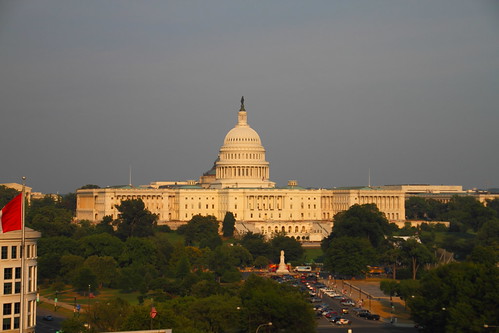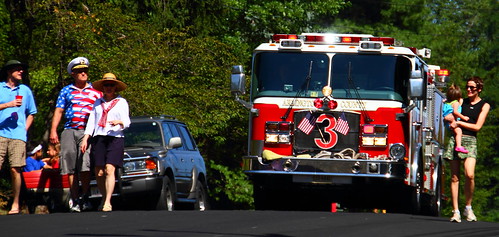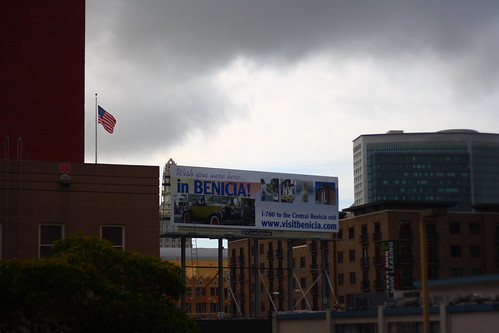 |
| US Capitol Building |
Election Day in the US comes tomorrow. It’s a bit strange, for us, because we voted months ago, so when we hear about such-and-such a ballot measure looking good in the polls, we have to think back to what we answered on our absentee ballots, do some research into the measure, and … well, think about it all over again. It’s also a bit nice, because we don’t have to actually participate in the discussion of the issues: we’ve already voted, so cannot be convinced of the rightness or wrongness of an issue any more, or not so that it “counts” for anything. Another strange thing about being so far removed from the US media is that we don’t have to hear the advertising. This has been quite nice, because it doesn’t look like any of the discussion taking place is … well, very nice.
 |
| 4th of July Parade, Virginia |
I don’t know if you’ve been following along with the Rally to Restore Sanity and its meta-discussion about political discourse, but it’s worth having a look, and a think. The whole thing has gotten me to thinking a bit about political discourse and the role it plays in today’s world as compared to the way it used to be incorporated into the world* 30 years ago; that is, the world prior to Reagan’s policy of “deregulation,” which began the changes which were eventually incorporated into the Telecommunications Act of 1996, whose results are summarized quite nicely by Molly Ivins.
 |
| US Embassy, Oakland, CA |
The world of my childhood, as I remember it, contained quite a rich element of both discourse and debate. It was the world of the McNeil/Lehrer News Hour, which usually included a round-table debate between 5 or 6 people who held different views; these were lively discussions between people who could actually discuss an issue without attacking each other, and their arguments served to bring out the nuances of the situation. It was also the world where every political candidate was guaranteed access to a certain amount of air-time on whichever news outlet was appropriate: if they were a national candidate, they were carried on a national news channel; a local candidate, they were carried on a local channel. The world is now a different place: the type of debate of today seems filled with vitriol and hatred, and politicians must buy their access to television.
 |
| Vallejo Marina & Yacht Club, Vallejo, CA |
These two differences, I think, have made the world a poorer place. The Rally to Restore Sanity is an effort to address the vitriol and hatred. However, it isn’t addressing the (perhaps far more important) issue of access to media; when access to media requires the outlay of huge sums, the messages presented will necessarily be shorter, and the politicians will necessarily be driven into being beholden to large donors. So, our politicians are not only not able to engage in the type of dialog which would encourage understanding, but they are selected for success by the wealthiest in the nation.
Perhaps the reason the discussion has degenerated is because that selection process has given us candidates which represent no section of society – perhaps we are frustrated and angry merely because of this fundamental change in the way the world works.
True, I am always willing to have a rational discussion. But, there again, I’ve stood somewhat outside of the political system, recognizing that all of the politicians presented were those who, on some level or other, were endebted to people whose aims and goals went opposite to my own: the ruling elite / the ultra-wealthy.
 |
| Downtown St. Helena, CA |
When I became old enough to think rationally about politics (my mid-20’s – being able to vote doesn’t imply being able to be rational about it), I realized that there were no politicians which embodied my own views. This allows me to step back a bit and have a meta-discussion on the way the system is constructed.
Perhaps those tens of thousands who attended the Rally have started something huge: a change to the fundamental political structure in the US. We can only hope, because the change that is needed is more than just a change in the way people speak, but in who has the ability to be heard.
-D
* Note: this article is about US politics, so let’s just agree that when I say “the world,” here, I’m talking about that context. I have no idea what goes into political discourse outside of that context, except within the very narrow confines of Scottish Academia and perhaps a bit about the political discourse of Germany as presented by Spiegel International (having read that for several years now).
I can’t go too much in depth about politics.. because my brain can’t handle it… but we do like to exercise our freedom to vote by voting for candidates we actually support in many ways – often meaning we are voting for write-in candidates. Most people challenge that to the effect of ‘then your vote doesn’t count!’ But we like to believe it’s actually somehow making a small change towards sanity. I find it difficult to believe the two party system is all we can expect. That’s one thing I liked about the UK – a party like the Green Party can actually have seats!!
Heather
Oh, my brain doesn’t handle it at all. I have to vote with something like smartvoter.org up and going, or the backwards wording on the propositions and amendments trips me up. All of the chatter makes my head want to explode, and we’re so grateful that we get just the barest minimum of it here.